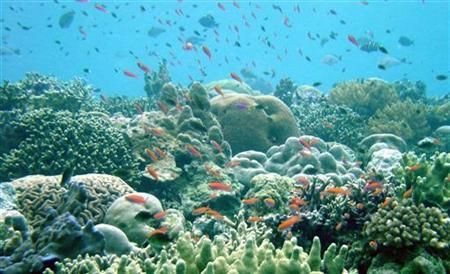Algae Help Coral Reefs Withstand The Impacts of Climate Change

Reef-building corals, algae, and other symbiotic marine organisms develop ecosystems that could withstand the impacts of climate change, says a new study. Understanding these relationships could aid in the efforts on reef conservation. The research led by the University of Exeter in the UK states that coral reefs may be more tolerant to variations in weather patterns than earlier thought. Scientists observed the presence of the alga Symbiodinium D in the Caribbean coral population and their resilience to stressful events such as ocean warming.
The research team concentrated their study on Orbicella annularis, a prominent and abundant Mountain star coral species in the Caribbean. Real-time PCR technique was used to screen 552 coral colonies. Symbiodinium presence was observed in almost 30 percent of every coral population from the Bahamas to Tobago. Symbiodinium D, an algae that commonly exist in these reefs is known for its resistance to high sea temperature and its low abundance in coral hosts. Findings in this coral-Symbiodinium study were published in the Feb.10 issue of the journal Coral Reefs.
Dr Emma Kennedy, lead author of the study and research fellow at Griffith University in Australia, said that corals depend on these tiny food producers for energy. However, events like ocean warming can disrupt this symbiotic relationship. The absence of algae also called zooxanthellae starves the corals and leads to bleaching. If the stressful event persists, the bleached corals might die or may take years to recover.
Prior studies on Orbicella annularis have demonstrated response to stressful conditions with the presence of Symbiodinium D. A 2007 research on the Great Barrier Reef used the real-time PCR analysis to detect abundance of tiny symbiotic marine organisms in the coral network. Symbiodinium D groups were spotted in 71 percent of the colonies. Abundance of Symbiodinium in Caribbean corals may indicate the possibility to tolerate warming events for the time being through shuffling of symbiotic organisms. However, the presence in many coral populations may not perhaps prevent other long-term impacts of stress on coral reef health.
Currently, Kennedy is doing related studies this time on coralline algae response to stress events. This would determine whether the organism can be used in observing the effects of prolonged weather variations on Australia’s Great Barrier Reef.
To send feedback about the content, email: jm_panganiban@hotmail.com





















